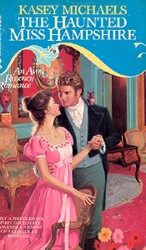

Even after death, as the ghost who haunts Miss Hampshire, Lucinda is advancing matches and offering Shakespearean quotations at crucial intervals in service of that goal. Having left her home jointly to Cassandra Hampshire and Philippos, Lord Hawedon with the condition that they must both stay there for two months together, Lucinda in effect binds her ghost to the house unless the match between the two works. Cassandra is the first to realize this problem when she meets the ghost:
"... Just here," Cassandra murmured hollowly,
"floating somewhere in
between. That is what you meant, isn't it? Oh, dear. Then you
are stuck here,
locked up on that chair forever!"
At last Lucinda's smile wavered. Clearly this thought, this depressing
thought, had not yet occurred to her. Clasping her beringed
hands theatrically
to her lace-draped breast, she exclaimed, "'Oh God! I
could be bounded in a
nutshell and count myself the king of infinite space, were it
not that I have bad
dreams.' Shakespeare." (63-64)
So Cassandra undertakes to charm the earl in order to free Lucinda's ghost while her ghost supplies her support through quotations from the bard, including an encouraging reference to the rose from Romeo and Juliet when Philippos is being most difficult.
Of course, Lucinda quotes freely from other sources as well and indeed must quote other writers around her friend, the dowager duchess, who berates the ghost when first seeing her, "'Shakespeare! How dare you quote the great Will to me, you vacant grinning twit ... It's one thing to come back and haunt me, but to quote Shakespeare to me at the same time? No! It is too much for one old woman to bear!" (87). Nonetheless, Kasey Michaels clearly envisions Shakespeare as central to the character, as her Author's Note at the end of the novel indicates: "So we have bid a final, fond farewell to Aunt Lucinda, who is off to join her adored Jerome, knowing that she would not wish our regrets, but only quote from the dowager duchess's beloved bard: 'If ever though shalt love,/In the sweet pangs of it remember me ...'" Through Lucinda's inability to escape the words of men, she usurps and extends Orsino's hyperbolic claim to his page--Lucinda becomes the one who has truly loved and who can enable the listening women in these novels to achieve the heightened romantic union he can only imagine in Twelfth Night.
Go to Introduction References by Play Return to Shakespeare Quoters
